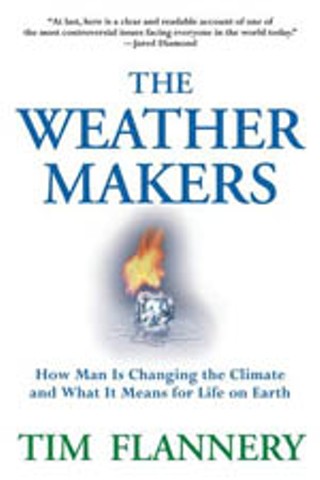Book Review: Readings
Tim Flannery
Reviewed by Nora Ankrum, Fri., March 10, 2006

The Weather Makers: How Man Is Changing the Climate and What It Means for Life on Earth
by Tim Flannery
Atlantic Monthly Press, 352 pp., $24
Humans have been affecting the climate for 8,000 years, since the beginning of agriculture, when the amount of methane we released into the air was enough to counter the planet's principal climatic cycles. Essentially, we created our own blissful "long summer." But once the Industrial Revolution hit, and the carbon dioxide from resources like coal became our favorite greenhouse gas, we created a habitat-destroying, species-killing, hurricane-spawning monster, known as global warming, that has us committed to a minimum 2-degree temperature rise by 2100 (the fastest 2-degree rise our planet saw before now took 1,000 years).That, I suppose, is why Tim Flannery's book is called The Weather Makers, rather than The Many Ways in Which We're Screwed or Everything You Ever Wanted to Know About CO2, both of which were surely contenders. As excited as everyone is about this book (heavy hitters from Collapse's Jared Diamond to Prime Minister Tony Blair are hailing it as the most important thing ever), I have to warn you that some portions are trying unless you read science texts in your spare time. I blame this on all you skeptics out there who still need convincing that global warming is real, dangerous, and simply the most important issue facing humanity: The exhaustive evidence in here is for you, and it certainly succeeds in its persuasiveness. Luckily for the rest of us, who already had the pants scared off of us when Bette Midler played a dying Mother Earth in the 1990 made-for-TV program Earth Day Special, The Weather Makers makes for a fascinating and therapeutic read despite the just-shoot-me pain of chapters like No. 11: "2050: The Great Stumpy Reef?".
It's fascinating in how its millennia-spanning narrative elucidates the history of our planet and our role on it, therapeutic because it provides straightforward answers to the most frustrating questions surrounding the global-warming issue. Most importantly, Flannery details what we can realistically do to prevent committing ourselves to further destruction. At this critical point, we can still save the world – minus most coral reefs and the communities they protect, the Inuit nation, and mountaintop ecosystems – without drastic lifestyle changes. Isn't that (almost) exactly what we want to hear?










